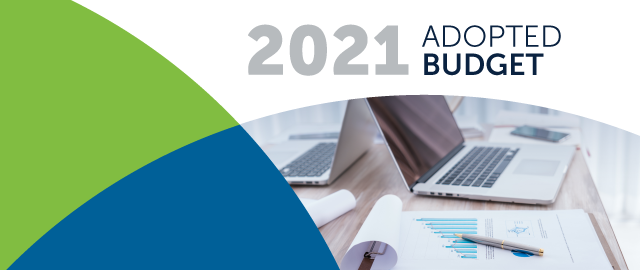Story
Gwinnett County Board of Commissioners adopts 2021 budget
Posted: January 5, 2021
Story Link: https://www.gwinnettcounty.com/home/stories/viewstory/-/story/Commissionersadopts2021budget_010520
In its first major vote of the year, the new Gwinnett County Board of Commissioners approved the 2021 budget.
The budget for 2021 totals $1.91 billion, up 3.7 percent from the 2020 adopted budget. It consists of a $1.47 billion operating budget and a $441 million capital improvements budget, which includes funds from the County’s SPLOST program.
2021 Budget At-a-Glance
2021 Budget in Brief
Adopted 2021 budget resolution summary
Adopted 2021 budget on Vimeo
Budget highlights presentation
“This budget addresses issues facing the County today and includes funds to help us face future challenges,” said Chairwoman Nicole Hendrickson. “It is important that the budget maintain important continuity in the excellent services and programs provided by the County while allowing this new board some flexibility for new ideas.”
Some aspects of the budget were tightened to reserve funding to deal with the uncertain impact of the COVID-19 pandemic and for new initiatives and improvements by the incoming Board of Commissioners, such as warming stations during periods of extreme cold and performance audits to increase accountability and efficiency.
The January 5 meeting was the first for Hendrickson, District 1 Commissioner Kirkland Carden, and District 3 Commissioner Jasper Watkins, who were all elected to the five-member board in November. The three joined sitting District 2 Commissioner Ben Ku and District 4 Commissioner Marlene Fosque, who are both entering their third year in office.
The budget was developed by outgoing Chairman Charlotte Nash based on six strategic priorities affirmed by the previous board during its annual planning session in 2020.
After nearly a year of dealing with the impacts of COVID-19, the Safe and Healthy Community goal remains a top priority with additional funding for the Gwinnett Public Health Department and continued coronavirus response. The budget also sets aside resources for the Situational Awareness and Crime Response Center, 33 new police positions (30 of those sworn), an expansion at the Police Training Center, and improvements to the Fire Academy.
The budget addresses the Mobility and Access priority with funding for transportation projects, many of which are paid for by SPLOST. It also includes money for an airport master plan and enhancements to the County’s Advanced Traffic Management network designed to reduce traffic congestion and quickly respond to traffic incidents.
For the Livability and Comfort priority, the budget funds two new parks in areas that are underserved by recreation opportunities, renovates and maintains existing parks, provides funding for the Gwinnett County Public Library system, and supports the HomeFirst Gwinnett initiative’scoordinated approach to addressing homelessness.
Initiatives receiving funding to support the Board’s Strong and Vibrant Economy priority include the new Rowen knowledge community, the Gwinnett Entrepreneur Center, and the new Water Tower water innovation center.
New positions in Information Technology, Transportation, and Elections are funded to meet the needs under the Smart and Sustainable Government priority.
Under the Communication and Engagement priority, the budget funds a new Police Community Affairs section, plus renewed emphasis on recycling and solid waste management. The budget also enhances community outreach with new positions and a continuation of the Gwinnett 101 Citizens Academy and Gwinnett Youth Commission programs.
The budget was developed after department directors and elected officials each presented business plans for 2021 to the budget review team in the fall.
Commissioners held a public hearing on the budget December 9 and accepted comments in writing and online through December 31 before making their final decision.

